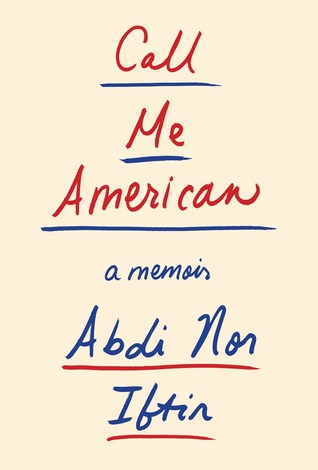Call Me American by Abdi Nor Iftin

First line: “I was born under a Neem tree, probably in 1985.”
I have felt at various times in my life that our country has lost its way. But at her best, I believe the United States can still be a shining example of democratic ideals–a nation that inspires hope of a better life and delivers on it.
Summary: Abdi liked to try out his best Michael Jackson moves for his friends and hung posters of American stars on his bedroom walls, despite his mother’s disapproval. Born in the countryside, Abdi’s family moves to Mogadishu, Somalia after a drought decimates their herds. His father becomes a successful basketball player and takes his sons out on the town. Abdi loves the city life, but soon his city is unrecognizable. Abdi watches as warlords overthrow the government and take control, killing indiscriminately and destroying Mogadishu. Abdi’s family is forced to flee.
Abdi, his brother, and his pregnant mother get separated from his father and eventually return to war-torn Mogadishu, having nowhere else to go. As Abdi says: “I am six years old and learning that nowhere in the world is safe.” The once cosmopolitan city has been reduced to rubble, and dead bodies pollute the roads.
A neighbor starts showing American movies in her garage and kids crowd around the tiny television screen to watch. While others talk through the dialogue, Abdi studies it closely and finds he had a knack for English. He idolizes Arnold Schwarzenegger and the brave Americans he sees on-screen. Thus, he becomes known as Abdi American. So when U.S. troops arrive to restore the freedom he used to know, he cheers them on. Then he watches in horror as the militiamen violently defeat the soldiers and parade their bodies through the streets.
To make matters worse, al-Shabbaab, a radical Islamist group, rises to power. With each passing year, the options for Abdi’s future narrow. Teenage boys are recruited and kidnapped by al-Shabaab, and his only way out is to become a madrassa teacher or flee. In his escape to Kenya, Abdi faces many setbacks. But then a life-changing event: Abdi has a chance encounter with an American journalist and they exchange information.
Life in Kenya is still fraught with danger. With the help of the journalist he met, Abdi risks his life leaving the safety of his apartment to secretly record his story. His account is broadcast on NPR and BBC radio programs for millions to hear. After overcoming seemingly insurmountable odds, and with the help of several dedicated people and a stroke of luck, Abdi American finally makes it to safety in the United States.
My thoughts: Abdi’s memoir offers a glimpse of what life is like in war-torn regions and sheds a light on the limited options available to those who live in them. I take democracy for granted, but Abdi wasn’t lucky enough to. It’s shocking to witness how quickly this modern capital city with restaurants and theaters is destroyed.
On a positive note, it’s refreshing to see the United States viewed through Abdi’s eyes. The idealized version of this country he imagines growing up becomes more complicated once he actually arrives, but I think it’s safe to say Abdi still loves America. And I like to think he’s still practicing those dance moves.
- What’s Ashley Reading?: She Didn’t See It Coming - July 18, 2025
- What’s Ashley Reading?: The Island Villa - July 4, 2025
- What’s Ashley Reading?: With a Vengeance - June 20, 2025
